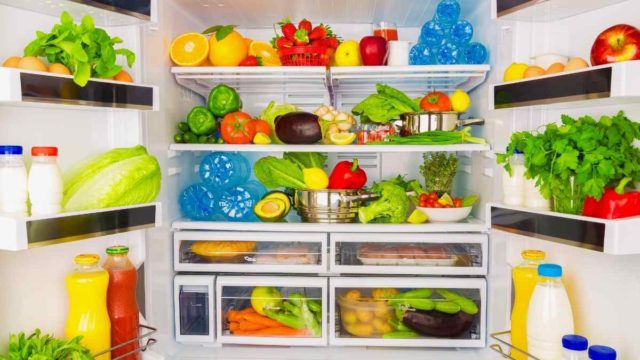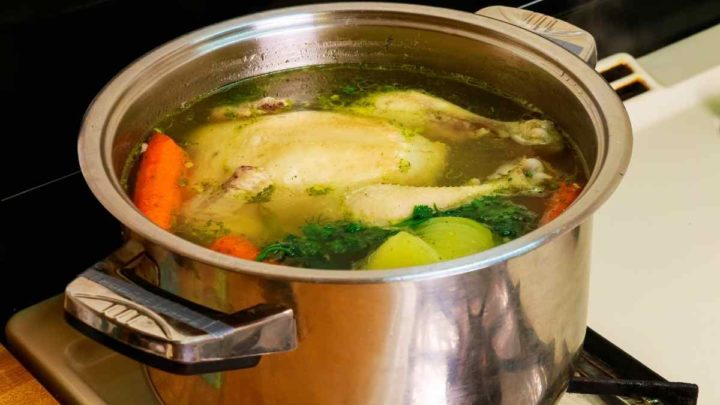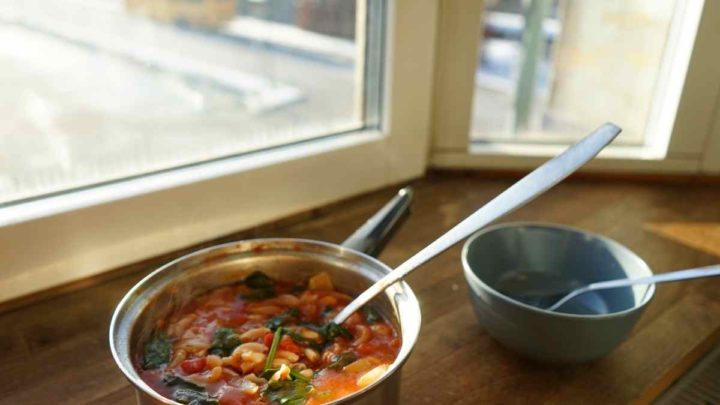A good soup completes a meal. It is a staple since the beginning concerning dining at home or in restaurants. The warm and flavorful broth it gives makes people happy. You can either sip it from the side of your spoon or drink it from a mug.
When making soup at home, we often can’t finish all the homemade soup and have some leftovers. Because ingredients are expensive, what you can do is to put them in the fridge. In this article, we’ll tackle how long should you wait to let the soup cool before storing it in the refrigerator.
You may also be interested in-
How Long to Cool Soup Before Refrigerating?
To not let your soup get bad or spoiled when refrigerating, let it sit on the counter for 2 hours. This is the perfect duration for your favorite soup to cool down and disperse all the heat it has.
If your soup however is in a very large pot or container it still might be too hot to put into the fridge even after two hours. What you can do in this situation is divide the soup into smaller containers or pots. Stir periodically which will increase the cooling rate of the soup. What this does is mix the cool soup at the edges of the pot with the warm soup which is in the middle – increasing the cooling rate.
You need to remember putting a hot container into the fridge might cause it to crack or break making a mess. Therefore calling the soup before putting it into the fridge will avoid the container breaking.
Can You Leave Soup Out Overnight to Cool?
You should not leave soup out overnight to cool because it will get spoiled. Soups are meant to be eaten or sipped when it’s warm and calming. And when they are at room temperature for more than two (2) hours, they begin to become spoiled. Bacteria will build up faster because the soup is right in the danger zone of the temperature range for them to grow.
Pathogenic bacteria are mostly aggressive at temperatures between 40 F and 140 F, which is also known as the “danger zone.”
So if you’re planning on consuming the soup tomorrow morning, you need to refrigerate it properly. There are a lot of containers to store your soups at like Tupperware, glass jars and takeaway plastic containers, etc.

Is It Safe to Simmer Soup All Day?
Yes, provided that you keep them at 150 degrees Fahrenheit. This is recommended for those who have restaurants or events at home. Constantly heating the soup prevents it from bacteria build-up and will not cause food poisoning. A very crucial reminder that you should always bear in mind is that once you take the soup off the stove, you need to serve it within the 2-hour food-safe window or cool it by putting the bowl or pot in a bigger bowl filled with ice to make the cooling process faster.
What Is the Best Wat to Simmer Soup
Can you slowly cook soup with the lid off what do you need to put it on? It is recommended by seasoned home cooks and professional chefs that when simmering soups, you need to do it with the lid on. This way, you may monitor the right amount of heat and avoid boiling the flavors away. Of course, keeping the lid also prevents the liquid or water content of the soup from evaporating potentially destroying the overall flavor of the soup.
Does Soup Need to Be Refrigerated?
Soup needs to be stored in the refrigerator especially if it contains meat or dairy products.
To give you an example an 8-inch pot filled almost to the top with cooked soup is going to take at least 100 minutes to cool and most of that will be right in the middle of the danger zone which is between 40° and 140°F. So immediately after that to our food so window the soup needs to go into the fridge. But what if it is still too hot the bacteria will continue to grow even in the fridge if it is in the temperature range that they can grow that is more than 40°F.
Ultimately you need to make sure that your soup is perhaps called in smaller pots or containers so that the process is quicker. One of the good things about soup however is when you reheat it you must reheat it above 160° to kill any bacteria. Preferably boil it for several minutes if you are concerned.

Can I Put Hot Soup Straight in The Fridge
Why can’t I put boiling soup immediately in the fridge?
There are many reasons and factors why it is not good practice to put food that is still very hot in the fridge to cool down.
1. Hot food in a refrigerator can make the fridge several degrees hotter, especially if it’s soup in a big pot. This is potentially dangerous because if the refrigerator temperature goes above 40°F then other food which is in cool storage now enters the danger zone for bacteria to start to grow on it as well. Especially cheeses meats that are prone to fast bacteria growth can become spoiled.
2. Even if the temperature that is safe it’s not exceeded it is still going to cause the refrigerator to use extra power to cool the soup. Therefore because it’s safe for up to 2 hours it’s much better to let the environment do the cooling or at least the pre-cooling for you. If your fridge is a little bit old and you cause it to overwork because of the hot soup for meals you put in the fridge you can find the compressor motor will burn out much earlier. So it is just good practice not to put very hot food into a refrigerator. Furthermore, residential refrigerators have very small compresses when compare to commercial operations where there are things like blast coolers and blast freezers that are designed to cool food quickly.
How to Cool Soups Faster Before Putting in The Fridge
Soups are usually made by boiling water and adding meat or vegetables and spices. They are then served hot.
But what do you do with leftover soup?
How do you make sure it is safe for storage and future eating. We have just covered why you should not put boiling hot soup straight into the fridge but how do you hear soup for the refrigerator safely within the two-hour food window that you have.

Read on to see how you can safely rapidly cool soup.
How To Cool Soup Quickly Using an Ice Water Bather
Using an ice water bath
A bath of ice water can help soups cool fast. This method helps to quickly and safely cool down the food.
- Place the soup kettle or pot in the ice bath.
- Stir periodically the soup to get rid of the heat and help it cool down.
How to Cool Soup Quickly Using Shallow Pans
Divide the big quantities into small pots or containers that aren’t deeper than 2.5 inches, then put them in the fridge.
Stir every now and then to help cool down.
Use cooling paddles
Calling pedals essentially a hollow stirrer that can be filled with water then frozen. Then these are placed into the hot soup and used to continually stir the liquid cooling the soup rapidly.
However, using your common sense and putting the soup into medium-sized containers in a cool ice bath and just using a wooden spoon or ladle to stir the soup every few minutes you will be surprised at how quickly it will cool down.

You can Use some ice in then soup to cool it down quickly.
One last method is to put some ice cubes directly into the soup. This method is best used if the soup has been made extra thick or the house has thickened up because some of the liquid has evaporated when it was boiling or simmering while waiting to be served.
Take charge of cooling soup. You should think about how you’ll cool your soup before making a big batch. Make sure you have a good food thermometer so that you can keep an eye on the temperature as it cools down.
Soup Left Out Overnight Is It Still Safe to Eat?
People who leave the soup in the bowl overnight wonder if it’s safe for human consumption after they’ve heated it up again.
When you bring the soup back up to boiling for one minute, active bacteria will be rendered inactive. If you keep the stock boiling for 10 minutes, the botulism toxin will be broken down, and the soup will be safe to eat.
If you leave soup or stock to cool over 1 or 2 nights, then boil it for a minimum of 10 minutes to render inactive any bacteria, will it be still safe to eat.
When food is left standing out for 2 days, it “almost certainly contains a lot of dangerous pathogens and the toxins they produce.”
Now you boil it for a long time so essentially you render non-toxic any of the pathogens that were present. So technically speaking the soup becomes safe to eat but remember you are also eating all the dead pathogens and it is likely it will not taste anywhere as good. Therefore I would discard soup that has been left for a long time outside of the fridge it just isn’t worth the risk.